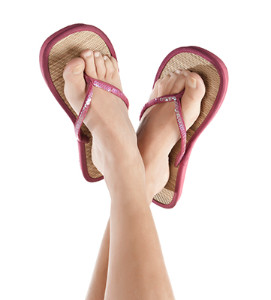 The type of footwear referred to as flip flops are popular summer shoes that are made of thin soles and typically are not meant to be worn for extended periods of time. Despite the fact that many people indulge in wearing these types of shoes, there may be moderate discomfort and symptoms that can be associated with them. These may include an achy feeling that may be present in the foot and ankle in addition to the formation of calluses and blisters. Other foot conditions that may develop as a result of wearing flip flops may be the development of bunions and hammertoes. The risk of injury may be increased from choosing to wear this type of shoe and this may occur as a result of a lack of stability. If you have questions pertaining to flip flops and would like additional information about the pros and cons for wearing this type of shoe, please schedule an appointment with a podiatrist who will be able to answer any questions you may have.
The type of footwear referred to as flip flops are popular summer shoes that are made of thin soles and typically are not meant to be worn for extended periods of time. Despite the fact that many people indulge in wearing these types of shoes, there may be moderate discomfort and symptoms that can be associated with them. These may include an achy feeling that may be present in the foot and ankle in addition to the formation of calluses and blisters. Other foot conditions that may develop as a result of wearing flip flops may be the development of bunions and hammertoes. The risk of injury may be increased from choosing to wear this type of shoe and this may occur as a result of a lack of stability. If you have questions pertaining to flip flops and would like additional information about the pros and cons for wearing this type of shoe, please schedule an appointment with a podiatrist who will be able to answer any questions you may have.
Flip-flops can cause a lot of problems for your feet. If you have any concerns about your feet or ankles, contact Dr. Sharon Pletcher from Pennsylvania. Our doctor will assist you with all of your foot and ankle needs.
Flip-Flops and Feet
Flip-flops have managed to become a summer essential for a lot of people. While the shoes may be stylish and easy to slip on and off, they can be dangerous to those who wear them too often. These shoes might protect you from fungal infections such as athlete’s foot, but they can also give you foot pain and sprained ankles if you trip while wearing them.
When Are They Okay to Wear?
Flip-flops should only be worn for very short periods of time. They can help protect your feet in places that are crawling with fungi, such as gym locker rooms. Athlete’s foot and plantar warts are two common fungi that flip-flops may help protect your feet against.
Why Are They Bad for My Feet?
These shoes do not offer any arch support, so they are not ideal for everyday use. They also do not provide shock absorption or heel cushioning which can be problematic for your feet. Additionally, you may suffer from glass cuts, puncture wounds, and stubbed toes since they offer little protection for your feet.
More Reasons Why They Are Bad for Your Feet
- They Slow You Down
- May Cause Blisters and Calluses
- Expose Your Feet to Bacteria
If you have any questions, please feel free to contact our office located in State College, PA. We offer the newest diagnostic and treatment technologies for all your foot care needs.
Read more about Flipping Out About Flip Flops



